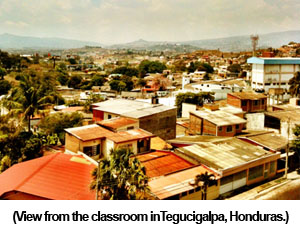Aaron Roth – Edify.org – “The Distance between Two Blocks” – Dec./Jan. 2015

Greetings everyone, I hope you all had a wonderful Christmas season and a great start to the new year. For the last three months I’ve been in constant travel, with three trips to Guatemala, one to both coasts of the United States and back to Lima Peru.
I have great news to report that we are gaining momentum with the program in Lima, Peru and have just signed an agreement in Guatemala! It’s been an exciting time with many new additions to Edify’s programs and teams, and transitions including my own upcoming transition from Edify to take some time off before I move back to the east coast to start graduate school this summer. I’ll cover that transition in the next newsletter, but in this one I’ll be writing about Guatemala in the newsletter below. -Aaron
- Download this email as a pdf: Aaron Roth – Dec./Jan. 2015 Update.pdf
- Edify worldwide – www.Edify.org
- Archive: AaronRoth.net – Monthly Newsletters
In December, I was in Guatemala City working with our newest microlending partner FAPE (Foundation for the Assistance of the Small Business) and we had planned to work on the agreement between Edify and FAPE in the executive director’s home after a meeting. As we pulled into the residential community where the executive director lives I thought to myself, “Hmm, this place looks familiar. Why do I know this place?”
I asked Manuel, the executive director, for the address and wrote down “Zona 13, Aurora II” to research in the afternoon. For some reason, I thought maybe I’d stayed near this place when I first came t o Guatemala almost five years ago. When I got back to my computer I went through my old emails to track down some of the places I’d stayed. Sure enough, deep into the archives I came across the very first place I stayed in Guatemala: a bed and breakfast (really a hostel) that had the address Zona 13, Aurora II. “But these areas are pretty massive anyway, it’s not like it’s that close to his house.” I thought.
o Guatemala almost five years ago. When I got back to my computer I went through my old emails to track down some of the places I’d stayed. Sure enough, deep into the archives I came across the very first place I stayed in Guatemala: a bed and breakfast (really a hostel) that had the address Zona 13, Aurora II. “But these areas are pretty massive anyway, it’s not like it’s that close to his house.” I thought.
So the next day, I asked Manuel, “Have you heard of this bed & breakfast?” and gave him the address.
“Well yeah, that’s just two blocks from my house,” he answered.
It was then that it dawned on me. In almost five years in my journey in Latin America I had progressed just two blocks!
Two blocks.
It felt odd knowing that I’ve gone thousands of miles just to arrive a stone’s throw from where I first began. It feels like I haven’t gone very far, like all the 3am-4am wake up calls for two and three connection flights, logging six to eight, even 10 hours on bus rides into distant communities didn’t add up to a grand total of anything. Maybe I felt a bit disappointed, like a hiker who prepares half a year for the difficult ascent, and arrives to find that they closed the trail and now the summit is accessible by a 30 minute gondola lift.
But that’s not how it is right? There is an enormous difference between the 30 feet that separates the entry-level employee and the CEO. It’s not the measurement of the physical distance at all. If we were to  extend out the years and the experience that separate those two positions the distance would be unfathomable.
extend out the years and the experience that separate those two positions the distance would be unfathomable.
Five years ago that first night in Guatemala, I was an anxious young man, fresh out of my corporate job, with feelings of excitement and uncertainty after realizing that the decision to go to Latin America could potentially shipwreck my career or carry me to a new, never before imagined destination. I couldn’t envision what the future would look like, it just looked like a never ending winding road clouded by fog and rain. My only real resolution was to just stay on the path, and try to maintain my momentum and excitement.
So then, five years later from that first night filled with uncertainty for the path laid before me, I was sitting a few hundred yards away, right next to the Vice President of Latin America for Edify, Luis Sena (appears above in the second picture) in the home of the executive director of the  Guatemalan MFI discussing the details about opening up the Edify program in Guatemala.
Guatemalan MFI discussing the details about opening up the Edify program in Guatemala.
In that meeting, I didn’t speak of conjecture, but rather from experience. Guatemala is the third country I have worked in, and my responses were from the decisions I have been a part of with my team based on experiences with schools with directors that I knew personally.
I’ve visited hundreds of schools over the past few years, spoken with 12 microfinance institutions and even more training and para-church organizations. I’ve helped write operating manuals for several microfinance projects, written dozens of reports, logged endless  hours in meetings, and presented to leadership teams in English and Spanish.
hours in meetings, and presented to leadership teams in English and Spanish.
If only I had known that five years later I’d be a more confident professional sitting with colleagues in a comfortable environment, I would have been relieved of my doubts and fears.
But I know now that in life there are many things that we don’t know at the time, and they aren’t for us to know in that specific time and place where we currently reside.
currently reside.
And that’s ok, the only requirement is that we have faith in the Maker of the paths. The paths of the past, and the paths of the future.
In Edify, we are incredibly excited about the future in Guatemala. We’ve met with two microfinance organizations and visited almost 30 schools around the capital and in three different regions to explore the potential for our microlending program to low-fee independent Christian schools.
It’s been such a blessing to work with our Guatemalan friends, Manuel Garcia and his team, from our first microlending partner in Guatemala. They truly share our mission to work in the economically poor communities to improve and expand these schools that want to serve the families in their communities.
 Trust in the Lord with all your heart and lean not on your own understanding; in all your ways submit to him, and he will make your paths straight. (NIV Proverbs 3:5-6)
Trust in the Lord with all your heart and lean not on your own understanding; in all your ways submit to him, and he will make your paths straight. (NIV Proverbs 3:5-6)
So I realize then, that instead of being disappointed in only traveling two blocks, I’m incredibly grateful to realize that the greatest distance the Lord ever required me to go was just two blocks.
If I had really known that and believed in His plan, I wouldn’t have been so worried about the great uncertainty that lay before me. Had I known it would have been just two blocks, I would have jumped out of my seat and started walking, relieved of any great doubts about the plan ahead.
From where I am today, I can rejoice in the great distance between two blocks: for this great adventure with the Lord and his people in Latin America. For all I’ve gotten to experience personally, walking with these school leaders, with men and women so passionate about impacting their communities because that’s what Christ called them to do. He knew that was what was up ahead, and I’m glad they trusted Him and I did too, with only small glimpses of the future he’s preparing. He was, and is, and will be, the Maker of good paths.
I pray that even in moments of uncertainty you have reassurance to know that the Lord has planned out the path you’ll take — even if it is only just two blocks.
Blessings to you all back home,
-Aaron

 with a family.So for that, I have to credit most of the Spanish I use every day, to the experiences from all the birthdays, church services, buying strange foods and eating them, and the endless cultural or language faux pas I’ve committed. But it’s not just words and phrases I picked up from them; I have learned a tremendous amount about local culture, and how to understand that very culture I intend to serve, and how living a life of witness goes even deeper than simply proclaiming those words.
with a family.So for that, I have to credit most of the Spanish I use every day, to the experiences from all the birthdays, church services, buying strange foods and eating them, and the endless cultural or language faux pas I’ve committed. But it’s not just words and phrases I picked up from them; I have learned a tremendous amount about local culture, and how to understand that very culture I intend to serve, and how living a life of witness goes even deeper than simply proclaiming those words.


 love, to not ask questions, to respect, to stand firm, to ask questions, to forgive, to be just, and to practice grace.
love, to not ask questions, to respect, to stand firm, to ask questions, to forgive, to be just, and to practice grace.


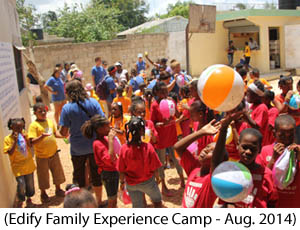
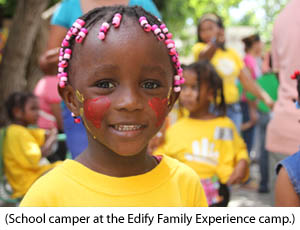 By having the ability to experience different economic realities during the day and discussing these differences using a technical guide, we allow guests to learn the theory at night and see it in practice during the day. I believe this is very important for our guests – including our staff – because when you have an open discussion on what works vs. what doesn’t, and what helps vs. what hurts, everyone benefits and we reduce the tendency to think of ourselves as superior, wealthier Americans with a lot to give and foreigners who are just waiting to receive.
By having the ability to experience different economic realities during the day and discussing these differences using a technical guide, we allow guests to learn the theory at night and see it in practice during the day. I believe this is very important for our guests – including our staff – because when you have an open discussion on what works vs. what doesn’t, and what helps vs. what hurts, everyone benefits and we reduce the tendency to think of ourselves as superior, wealthier Americans with a lot to give and foreigners who are just waiting to receive.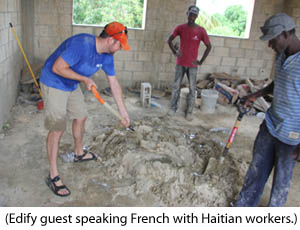 better than trying to mandate the feelings or conclusions people come away with.
better than trying to mandate the feelings or conclusions people come away with.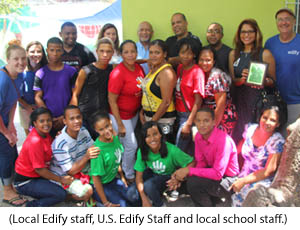
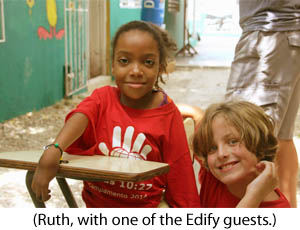
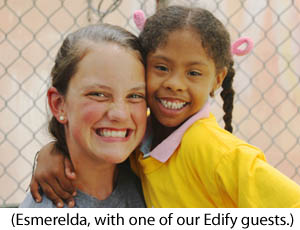 she needs a bit more management because she has Down’s syndrome, but you could also say she’s tuckered out from being around so many people she wants to meet.
she needs a bit more management because she has Down’s syndrome, but you could also say she’s tuckered out from being around so many people she wants to meet.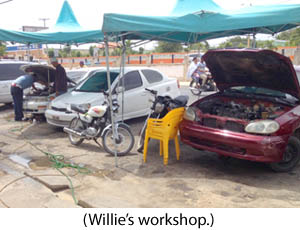
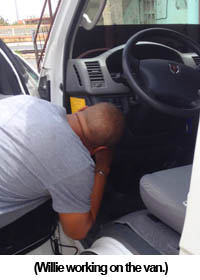
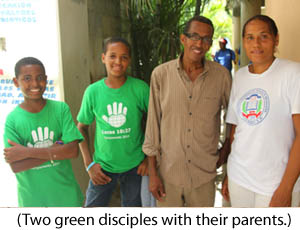
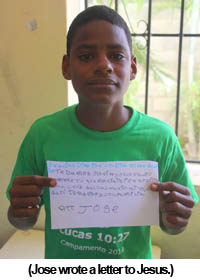 Republic for a long time. They want to connect, so they asked me what my last name is to find their uncle, me, on Facebook. I joke with them that I don’t know it, and when I ask for suggestions for last names I ask them who some famous Dominican baseball players are.
Republic for a long time. They want to connect, so they asked me what my last name is to find their uncle, me, on Facebook. I joke with them that I don’t know it, and when I ask for suggestions for last names I ask them who some famous Dominican baseball players are.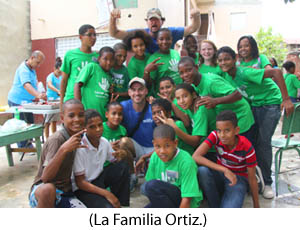
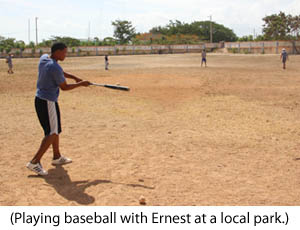
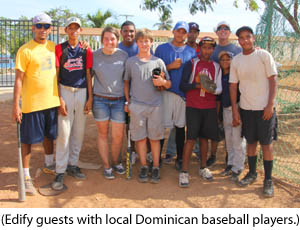 I asked him about what he thought of his younger brother, “You know, he’s the real natural. When he gets his growth spurt, I think he’s got potential. But I don’t want him to go down the road I did. I want him to have a better future. I want him to finish school first.”
I asked him about what he thought of his younger brother, “You know, he’s the real natural. When he gets his growth spurt, I think he’s got potential. But I don’t want him to go down the road I did. I want him to have a better future. I want him to finish school first.”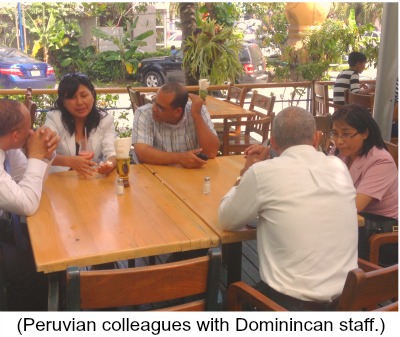
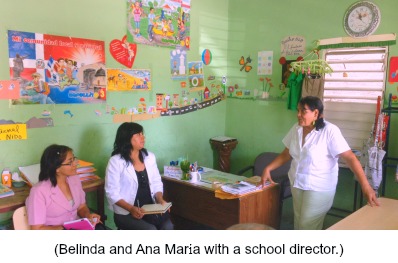
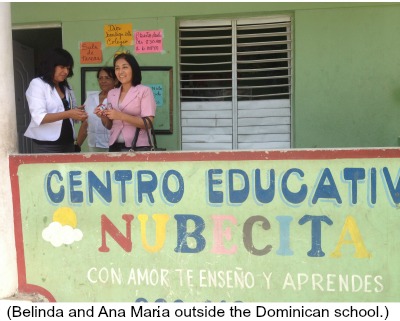
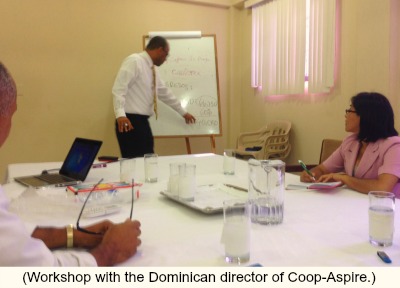 Honestly, the middle was hard. It was hard for the simple reason that I came with a purpose, and I hadn’t been able to fulfill it. Let me remind you though, that this is kind of an American struggle. Many of my Latin America friends do not usually align their feelings of spiritual fulfillment with career success. (I’ve often said to many of my friends back home that Americans aren’t really fulfilled unless they are slightly dissatisfied with their progress. How can we ever find peace with this kind of mentality? Anyway, that’s a topic for another newsletter . . .)
Honestly, the middle was hard. It was hard for the simple reason that I came with a purpose, and I hadn’t been able to fulfill it. Let me remind you though, that this is kind of an American struggle. Many of my Latin America friends do not usually align their feelings of spiritual fulfillment with career success. (I’ve often said to many of my friends back home that Americans aren’t really fulfilled unless they are slightly dissatisfied with their progress. How can we ever find peace with this kind of mentality? Anyway, that’s a topic for another newsletter . . .)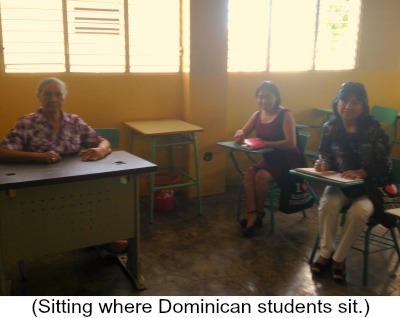
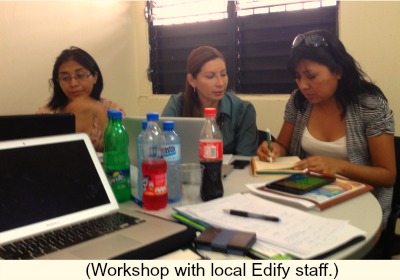
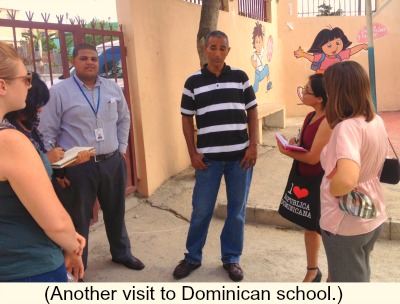
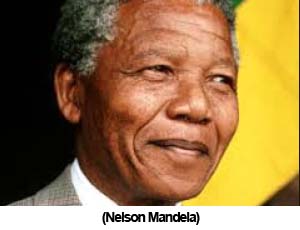
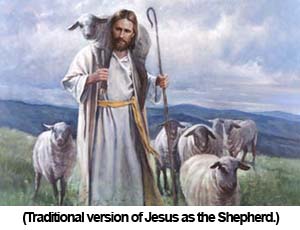 Psalm 23
Psalm 23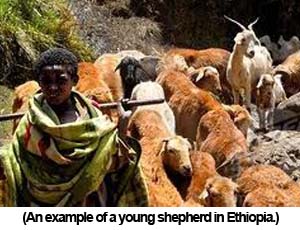 across his shoulders. I remember seeing my brother pick up a sheep and place it across his shoulders when it was weak. It is a true thing. Shepherds do that. . . . I love that story, because I have been carried by Jesus like that.”
across his shoulders. I remember seeing my brother pick up a sheep and place it across his shoulders when it was weak. It is a true thing. Shepherds do that. . . . I love that story, because I have been carried by Jesus like that.”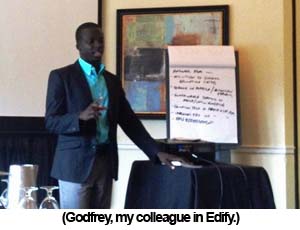 the director about a scholarship and he told me that the only way to receive a scholarship was to repeat certain grades of middle school and perform well so that I could attend high school. I was so disappointed, but I knew that this was the Lord’s plan for me and I should accept it.
the director about a scholarship and he told me that the only way to receive a scholarship was to repeat certain grades of middle school and perform well so that I could attend high school. I was so disappointed, but I knew that this was the Lord’s plan for me and I should accept it.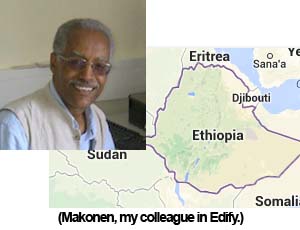
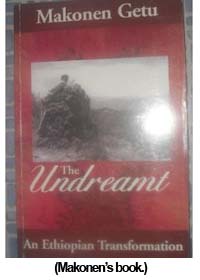 evangelization, he’d like to get back in the pulpit. (What a guy!)
evangelization, he’d like to get back in the pulpit. (What a guy!)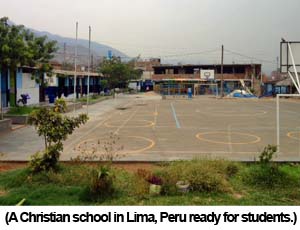 there truly is a pathway out of poverty.
there truly is a pathway out of poverty.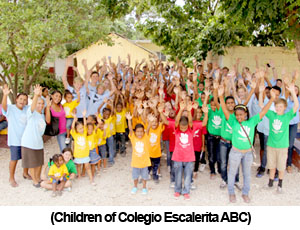 Edify worldwide –
Edify worldwide – 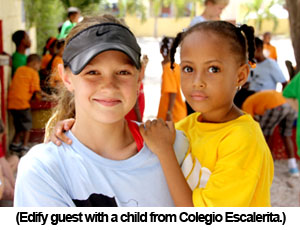 So this past July we spent two weeks in a city in the East of the Dominican Republic called La Romana. Each week we had five different families participate in a four-day camp that involved a work project, English classes, crafts, recreation and a devotional. The final day we had a celebration, like a carnival, where we invited the parents and the siblings of the students. You’re probably very familiar with this description of this kind of camp as it sounds like many short-term mission trips that churches typically do.
So this past July we spent two weeks in a city in the East of the Dominican Republic called La Romana. Each week we had five different families participate in a four-day camp that involved a work project, English classes, crafts, recreation and a devotional. The final day we had a celebration, like a carnival, where we invited the parents and the siblings of the students. You’re probably very familiar with this description of this kind of camp as it sounds like many short-term mission trips that churches typically do.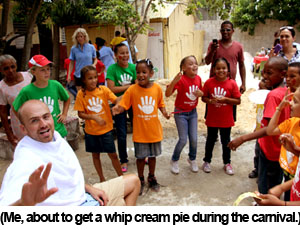
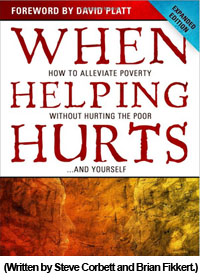 We’re trying to build a program with these schools that doesn’t fade away after the week that the teams leave or the funds dry up. Now, we’re not perfect by any means, but we are trying to do things differently, and we consistently ask our partners and people we serve how we can improve what we do in the communities where we work.
We’re trying to build a program with these schools that doesn’t fade away after the week that the teams leave or the funds dry up. Now, we’re not perfect by any means, but we are trying to do things differently, and we consistently ask our partners and people we serve how we can improve what we do in the communities where we work.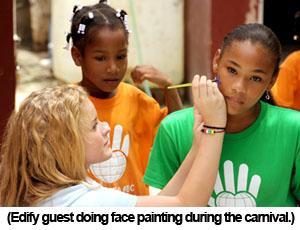 r and then onto each sphere of relationships. So when we go into these schools we must treat each other similarly: as broken as we may be, we know that the path out of it is led by our redeemer, Jesus.
r and then onto each sphere of relationships. So when we go into these schools we must treat each other similarly: as broken as we may be, we know that the path out of it is led by our redeemer, Jesus.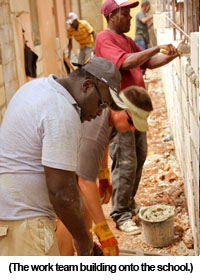 One of our guests had decided to join the work project during the first week. He and his family have done a lot of work with a missions organization that builds houses for economically poor families in Mexico. He’s pretty good with tools, and has a lot of experience in construction, so it seemed like a natural fit for him to join the Haitian and Dominican workers in building onto the school’s wall during the first week.
One of our guests had decided to join the work project during the first week. He and his family have done a lot of work with a missions organization that builds houses for economically poor families in Mexico. He’s pretty good with tools, and has a lot of experience in construction, so it seemed like a natural fit for him to join the Haitian and Dominican workers in building onto the school’s wall during the first week.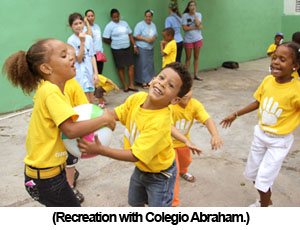 this pain, and had found relief. We all crouched there for a few minutes as our guest helped this man breathe through his pain, and gradually the wincing and the moaning stopped. There wasn’t any language spoken in these minutes; it was as if we were all just teammates trying to help our buddy out.
this pain, and had found relief. We all crouched there for a few minutes as our guest helped this man breathe through his pain, and gradually the wincing and the moaning stopped. There wasn’t any language spoken in these minutes; it was as if we were all just teammates trying to help our buddy out.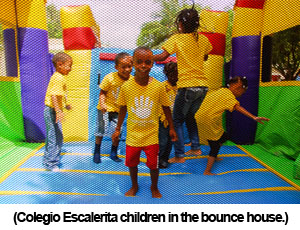 set the bounce house ticket price at five tickets (well below market value). And as many more, almost too many children wanted to go through it, we raised the price to 10 tickets (approximate market value). One young man who had to decide between waiting in line at the free bounce house and playing tic-tac-toe bean bag toss with no line, first chose the bean bag toss to earn tickets. Upon arriving at the entrance to the bounce house, he was told that it now cost five tickets. He left to go earn more tickets and came back with eight. Unfortunately, for him the price had just been raised to 10 tickets.
set the bounce house ticket price at five tickets (well below market value). And as many more, almost too many children wanted to go through it, we raised the price to 10 tickets (approximate market value). One young man who had to decide between waiting in line at the free bounce house and playing tic-tac-toe bean bag toss with no line, first chose the bean bag toss to earn tickets. Upon arriving at the entrance to the bounce house, he was told that it now cost five tickets. He left to go earn more tickets and came back with eight. Unfortunately, for him the price had just been raised to 10 tickets.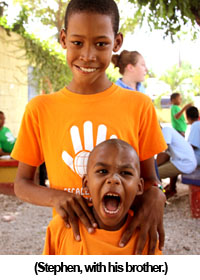
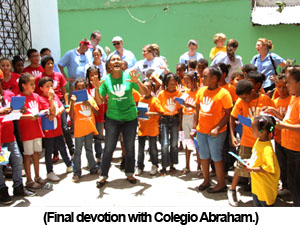 To finish out our final day each week, we had a celebration with the parents of the schoolchildren and friends and family in the neighborhood. We ordered enough food to feed over 200 people during the lunch break. After the big celebration of the games and the tickets during the carnival, it was a time to reflect on just what community means, and what it can mean for people like us, North Americans, and those who live in more economically impoverished areas. We had a really simple message that the director of the school (pictured left) gave us.
To finish out our final day each week, we had a celebration with the parents of the schoolchildren and friends and family in the neighborhood. We ordered enough food to feed over 200 people during the lunch break. After the big celebration of the games and the tickets during the carnival, it was a time to reflect on just what community means, and what it can mean for people like us, North Americans, and those who live in more economically impoverished areas. We had a really simple message that the director of the school (pictured left) gave us.
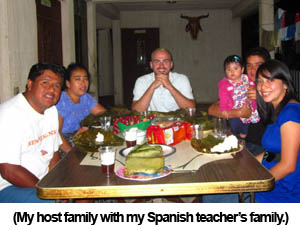 Edify worldwide –
Edify worldwide – 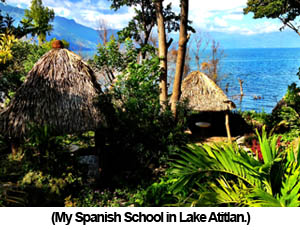 This statement was retold to me by a loan officer of a local Guatemalan Microlending Institution who was teaching rural women about the inequality of gender, and how they should value the female gender and should stand up for the rights of their little girls to attend school and seek educational and vocational opportunities. Inequality still exists in many parts of the world, not just in money or power, but in gender. Very often, when we think of poverty, it’s a description of inequality in economic class, education, or opportunity, but I’ve come to see poverty also as a lack of values or appreciation of life.
This statement was retold to me by a loan officer of a local Guatemalan Microlending Institution who was teaching rural women about the inequality of gender, and how they should value the female gender and should stand up for the rights of their little girls to attend school and seek educational and vocational opportunities. Inequality still exists in many parts of the world, not just in money or power, but in gender. Very often, when we think of poverty, it’s a description of inequality in economic class, education, or opportunity, but I’ve come to see poverty also as a lack of values or appreciation of life.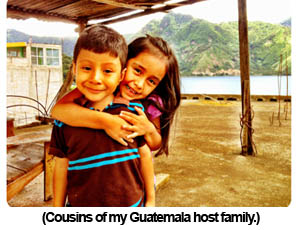 Now keep in mind, even in the tiny rural village where this training took place, culture is a behemoth that everyone can see, but very few can move on their own. It takes years to form itself, and sometimes it sets in like concrete, which means it takes years to reform or change. When any development or missional organization talks about transformation of any sort, be it economical, behavioral, or spiritual, they are entering into a long term process. I’m always hesitant to speak of rapid transformation in the work we do with microlending to schools, because when we try to improve the quality of education, and build on projects to schools, we’re talking about beginning a process for change with a diverse group of individuals who carry their own vision for the school.
Now keep in mind, even in the tiny rural village where this training took place, culture is a behemoth that everyone can see, but very few can move on their own. It takes years to form itself, and sometimes it sets in like concrete, which means it takes years to reform or change. When any development or missional organization talks about transformation of any sort, be it economical, behavioral, or spiritual, they are entering into a long term process. I’m always hesitant to speak of rapid transformation in the work we do with microlending to schools, because when we try to improve the quality of education, and build on projects to schools, we’re talking about beginning a process for change with a diverse group of individuals who carry their own vision for the school.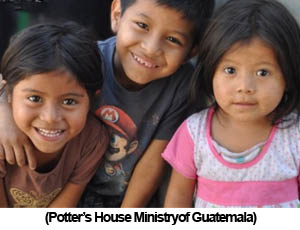 I think it’s better to say that as a development or missional organization from the States we are joining a team with a common goal. When we work together for long-term results, not just short-term projects that look good on powerpoints and photos, real transformation is possible. Real culture change is possible.
I think it’s better to say that as a development or missional organization from the States we are joining a team with a common goal. When we work together for long-term results, not just short-term projects that look good on powerpoints and photos, real transformation is possible. Real culture change is possible.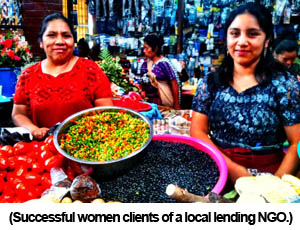 primarily with telling the students that they themselves are valuable. He elaborates:
primarily with telling the students that they themselves are valuable. He elaborates: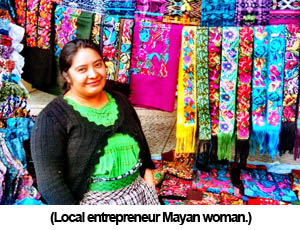 students in the school value them because they came to help, and because they stayed. They invested in the community, and the community trusts them.
students in the school value them because they came to help, and because they stayed. They invested in the community, and the community trusts them.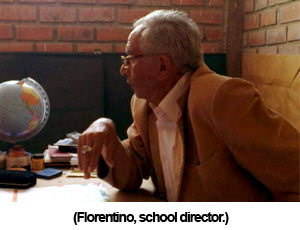 Edify worldwide –
Edify worldwide – 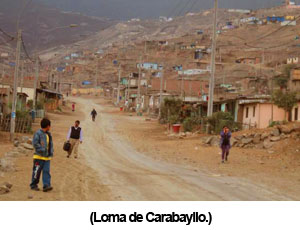
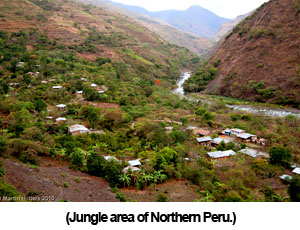 as we think of it being English and Spanish. Instead, his bilingual school was Spanish and Quechua, the native language to those who live in the rural areas and the jungle.
as we think of it being English and Spanish. Instead, his bilingual school was Spanish and Quechua, the native language to those who live in the rural areas and the jungle.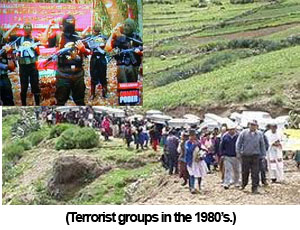 Florentino has a unique story to us, one of a true entrepreneurial bootstrapper, but his journey from the jungle to the center of Lima has become more common over the past few years. As the director of a local microfinance organization told us, “Lima is our ‘American Dream.’ To get a job and raise a family in Lima is what millions of Peruvians aspire to do.”
Florentino has a unique story to us, one of a true entrepreneurial bootstrapper, but his journey from the jungle to the center of Lima has become more common over the past few years. As the director of a local microfinance organization told us, “Lima is our ‘American Dream.’ To get a job and raise a family in Lima is what millions of Peruvians aspire to do.”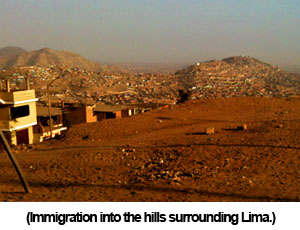 Florentino opened up his school ten years ago, more than 50 students were initially enrolled, and his staff tried to keep up with demand. He tells us that the parents wanted their kids in schools but didn’t want to pay the $8 monthly fee for a private education. Undeterred, Florentino didn’t give up, and persevered in the first few years to enroll more and more students and work with parents to pay an adequate amount so that he could staff the school.
Florentino opened up his school ten years ago, more than 50 students were initially enrolled, and his staff tried to keep up with demand. He tells us that the parents wanted their kids in schools but didn’t want to pay the $8 monthly fee for a private education. Undeterred, Florentino didn’t give up, and persevered in the first few years to enroll more and more students and work with parents to pay an adequate amount so that he could staff the school.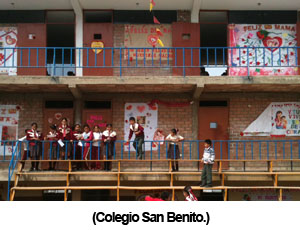 “I’m not so worried about getting to a specific number, or having another school. I want these children to have a quality education, and that means finishing the science lab. Later, I’ll continue to expand the computer room. It’s my duty to provide them with a solid education.”
“I’m not so worried about getting to a specific number, or having another school. I want these children to have a quality education, and that means finishing the science lab. Later, I’ll continue to expand the computer room. It’s my duty to provide them with a solid education.”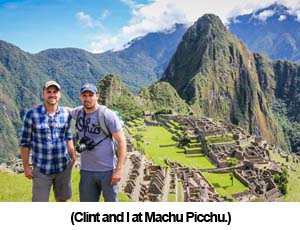 Edify worldwide –
Edify worldwide – 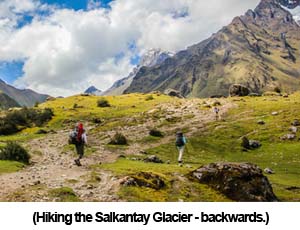 Clint and I, both sitting down to rest our lungs, commented on how true that observation was. Machu Picchu sits on a small mountaintop in the cradle of the behemoths surrounding it, a man-made anomaly almost eclipsed by the view of towering giants. You really have to hike up a ways to see this and appreciate the true nature of its location. We started out with the intention of reaching the Machu Picchu Mountain summit, but chose to return after more than an hour of steep hiking. We had already climbed 1,500 feet in 40 min at about 5:00am earlier that morning and we needed a break.
Clint and I, both sitting down to rest our lungs, commented on how true that observation was. Machu Picchu sits on a small mountaintop in the cradle of the behemoths surrounding it, a man-made anomaly almost eclipsed by the view of towering giants. You really have to hike up a ways to see this and appreciate the true nature of its location. We started out with the intention of reaching the Machu Picchu Mountain summit, but chose to return after more than an hour of steep hiking. We had already climbed 1,500 feet in 40 min at about 5:00am earlier that morning and we needed a break.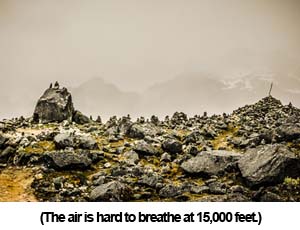 breathe as I did walking up that mountain.
breathe as I did walking up that mountain.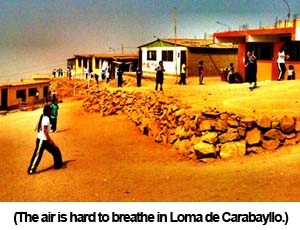 those initiatives, we also provide teacher training so that the schools improve their level of education and stay competitive nationally. Most of these schools charge about $25-40 a month, or roughly $1-$2 a day. This may not sound like a lot to us, but this is an enormous struggle for parents. They pay it because they know the alternative is that their child will be crammed in a classroom with 35 to 40 other students. Very little attention will be paid to their son or daughter, and they probably won’t progress even in the most basic of subjects: reading and writing.
those initiatives, we also provide teacher training so that the schools improve their level of education and stay competitive nationally. Most of these schools charge about $25-40 a month, or roughly $1-$2 a day. This may not sound like a lot to us, but this is an enormous struggle for parents. They pay it because they know the alternative is that their child will be crammed in a classroom with 35 to 40 other students. Very little attention will be paid to their son or daughter, and they probably won’t progress even in the most basic of subjects: reading and writing.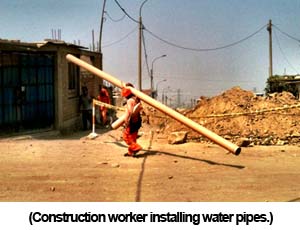 ,000) students, they’ve run out of adequate bathroom space and finances to build more bathrooms, which also means the children will wait another year or two before they can pave the recess area to deal with the tremendous amount of dirt and dust kicked up in the air.
,000) students, they’ve run out of adequate bathroom space and finances to build more bathrooms, which also means the children will wait another year or two before they can pave the recess area to deal with the tremendous amount of dirt and dust kicked up in the air.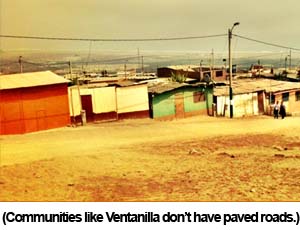
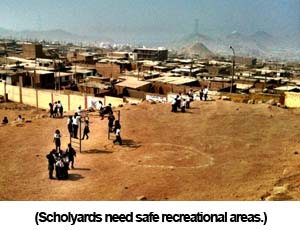
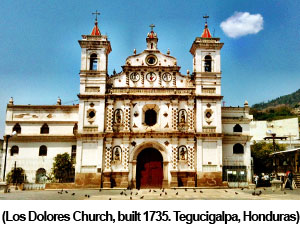 Edify worldwide –
Edify worldwide – 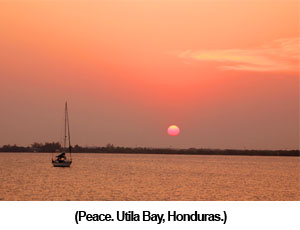 safety where I live, but I just found that difficult in Honduras. For one, everything closes at 6:00 or 7:00pm due to the danger of theft or robbery in the evening. Banks stop taking deposits at 4:00pm, and close their heavy doors at 5:00. Everything is guarded by private security with weapons, even the Burger King.
safety where I live, but I just found that difficult in Honduras. For one, everything closes at 6:00 or 7:00pm due to the danger of theft or robbery in the evening. Banks stop taking deposits at 4:00pm, and close their heavy doors at 5:00. Everything is guarded by private security with weapons, even the Burger King.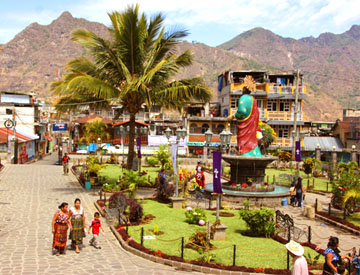
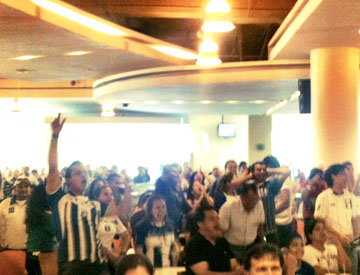

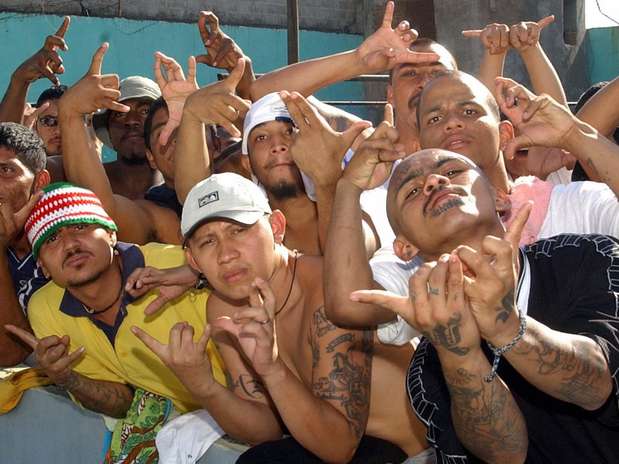
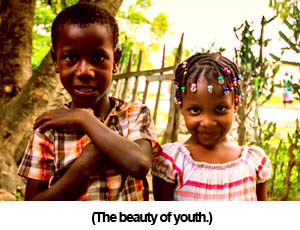 where I encountered similar initial negative stereotypes:
where I encountered similar initial negative stereotypes: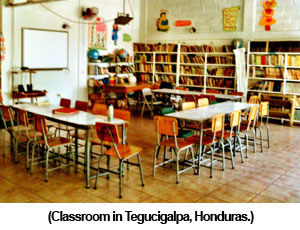 reason Honduras is a difficult place to live and travel gives us even more cause to help bring hope and Christian witness to difficult areas.
reason Honduras is a difficult place to live and travel gives us even more cause to help bring hope and Christian witness to difficult areas.